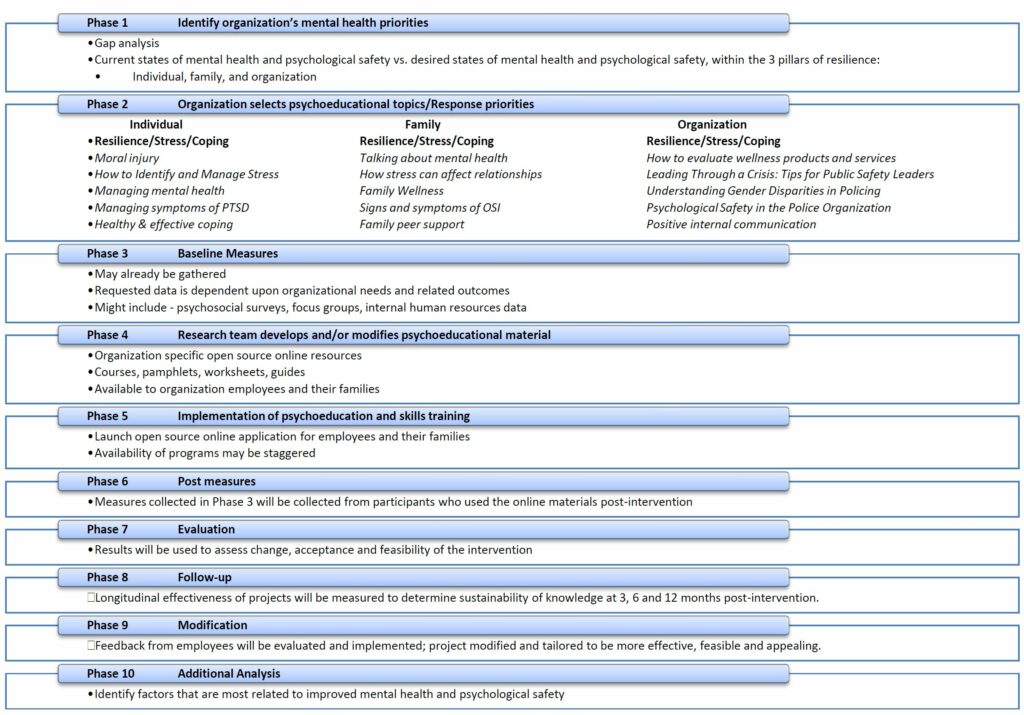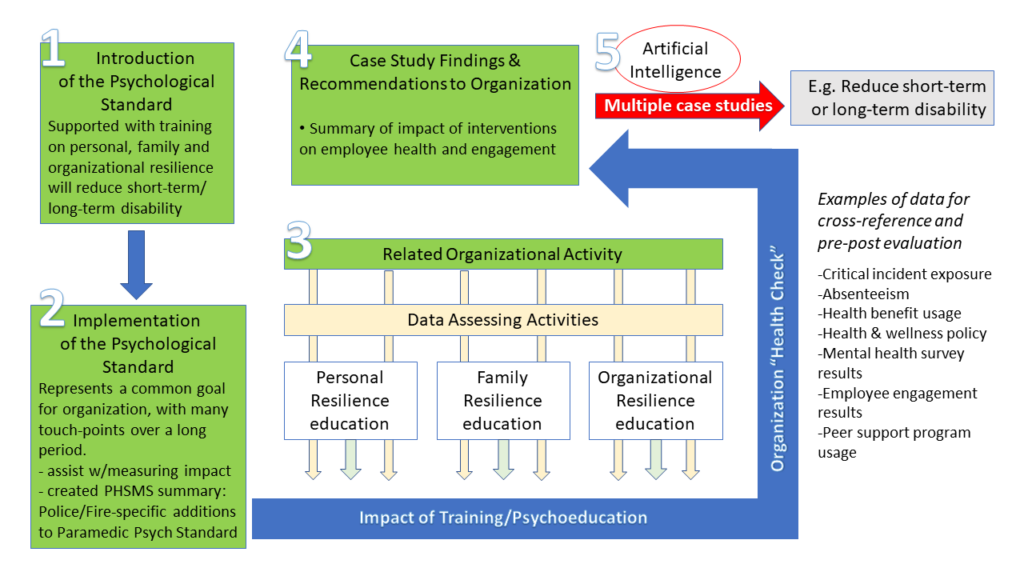This study adopts a novel operational definition of resilience, conceptualized as an ecosystem that includes three pillars of resilience – the individual, their family, and their workplace – as its framework. Each of these pillars influences one another reciprocally and has a major impact on an individual’s ability to respond to traumatic exposures. In addition, a holistic multi-level perspective of resilience, including biological, psychological, social, sex, gender, and environmental factors, is recognized in this study.
The immediate aim is to promote resilience in fire and police organizations to foster long- term post-traumatic growth and decrease the risk of employees developing post-traumatic, operational and organizational stress injuries. The long-term goal over the course of this three-year project is to develop and implement user-informed psychoeducational materials and training courses that will improve resilience, which in turn will reduce the risk of developing post-traumatic stress injuries and/or mental health disorders that plague public safety employees (PSE).
The process of this study may be novel to your organization. Using integrated knowledge transfer [iKT], this innovative study takes a co-creation approach to research where participating fire and police organizations are viewed as partners and knowledge users. In other words, the organization drives the focus of the study.
Each organization will act as a case study to a larger project. The following outlines the within-organization process:

The schematic below shows the overall process of how each organization will be involved in the research:

To read the executive summary of our research proposal, please click on the download button.
Resources for Organizations
BC First Responders’ Mental Health
• searchable resources for PSP leaders – https://bcfirstrespondersmentalhealth.com/looking-to-help/as-leaders/
Canadian Association for Suicide Prevention
• https://suicideprevention.ca/
Canadian Centre for Occupational Health and Safety (CCOHS)
• https://www.ccohs.ca/
• Healthy Minds at Work: https://www.ccohs.ca/healthyminds/
Canadian Institute for Public Safety Research and Treatment (CIPSRT)
• https://www.cipsrt-icrtsp.ca/
• Understanding the Life Cycle of Research – https://www.cipsrt-icrtsp.ca/en/cipsrt-releases-a-step-by-step-guide-that-explains-the-research-process
Canadian Mental Health Association (CMHA)
• www.cmha.ca
Centre for Addiction and Mental Health (CAMH)
• https://www.camh.ca/
Excellence Canada
• Workplace Mental Health Essentials Toolkit – https://excellence.ca/mentalhealthmonth2021/#
Guarding Minds at Work
• https://www.guardingmindsatwork.ca/
Mental Health Commission of Canada (MHCC)
• https://mentalhealthcommission.ca/
• Workplace Mental Health – https://mentalhealthcommission.ca/what-we-do/workplace/
Public Safety Canada
• The Civilianization of Police in Canada: https://www.publicsafety.gc.ca/cnt/rsrcs/pblctns/2015-r042/index-en.aspx
Road to Mental Readiness (R2MR) – renamed as The Working Mind for First Responders (TWMFR)
• https://www.cipsrt-icrtsp.ca/en/training/r2mr
• CIPSRT’s R2MR 2019 Review: https://www.cipsrt-icrtsp.ca/en/policy-brief/r2mr-2019-review
• The Working Mind for First Responders – https://theworkingmind.ca/working-mind-first-responders
Workplace Strategies for Mental Health
• https://www.workplacestrategiesformentalhealth.com/topic/Organizational-strategies
• https://www.workplacestrategiesformentalhealth.com/resources/on-the-agenda-workshop-series
• https://www.workplacestrategiesformentalhealth.com/resources/a-tool-to-support-employee-success